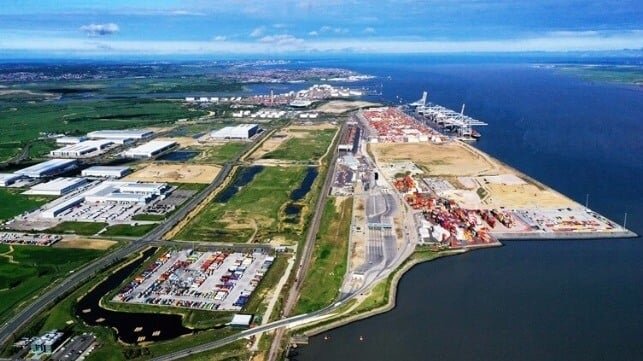The UK’s Border Force Seizes Record Amount of Cocaine in Major Drug Smuggling Operation
The UK’s Border Force is celebrating a significant victory in the fight against drug smuggling with one of the largest seizures of cocaine in the country’s history. This success is attributed to an intelligence-led operation and the increasing collaboration among international law enforcement agencies to disrupt the illegal drug trade.
The specific vessel involved in the smuggling operation was not disclosed by authorities, but it was revealed that the container carrying the illicit drugs had originated from Panama and was destined for the London Gateway port. The smugglers had taken elaborate measures to conceal the contraband, burying it deep within a container filled with legitimate cargo. To access the target container, law enforcement had to navigate through 37 other containers, a process that took nearly two days to complete.
Upon inspecting the container, officials discovered a staggering 2.4 tonnes of cocaine concealed in over 2,000 blocks. The estimated street value of the seized drugs is approximately $133 million, marking it as the sixth-largest cocaine seizure on record by the Border Force.
International Cooperation and Anti-Drug Efforts
The success of this operation underscores the importance of international cooperation in combating drug trafficking. Authorities reported that they are collaborating with law enforcement agencies worldwide to disrupt the flow of narcotics. Additionally, efforts are being made to implement training programs and enhance cooperation in Latin America to prevent drugs from reaching the UK and Europe.
The seized shipment, intercepted on June 14, is believed to be linked to a larger smuggling network associated with South American cartels. While this seizure was substantial, it pales in comparison to previous busts, such as the 5.7-tonne seizure at the Port of Southampton in 2024 and the 3.2-tonne seizure in 2015 at the same port.
Ongoing Challenges and Sophisticated Smuggling Techniques
Despite the efforts of European and international law enforcement agencies, the drug trafficking problem persists. Europol estimates that only 10 to 15 percent of cocaine shipments are intercepted at European ports, highlighting the need for continued vigilance and enhanced security measures.
Smugglers have been employing sophisticated tactics to evade detection, including infiltrating port operations to obtain release codes for containers or bribing crew members to drop drug parcels near shore for retrieval by accomplices. These elaborate schemes pose a significant challenge to authorities tasked with combating drug smuggling.

